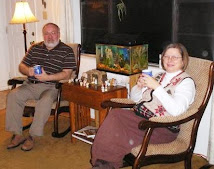 The following is an article I wrote some years ago on Thanksgiving that may be of interest:
The following is an article I wrote some years ago on Thanksgiving that may be of interest:
Thanksgiving Day 2004
Dear Family and Friends,
The column that follows is my latest Hebrew "Word of the Week,” which I have been writing for a few months. Also, there's a "Rest of the Story" to this column relating to our family and its India connection. (Note for non-family: Kathy’s father and his five siblings grew up in India at a school in the Himalayas for missionary kids. Coincidentally, Kathy’s mother grew up at the same school, where she met Kathy’s father!)
It seems that the meaning of Tarnegol Hodu in Hebrew is Indian Chicken. (Through a delightful coincidence the word Hodu also means "Give Thanks,” in addition to referring to the nation of India. Our Jewish friends eat turkey (Indian Chicken) during Purim in reference to King Ahasuerus, who reigned from India (Hodu) to Ethiopia (Cush) according to the first verse of the book of Esther.
Many languages use variations of the English word Turkey (we use the same word for the bird as for the country). Interestingly, in Turkey, turkey is called Hindi, which means "coming from India"! In Catalan, it is gall dindi or Indian cock. In Basque it is Indian hen. Many languages refer to turkey as Indian chicken, rooster, or hen. In Russian it is Indiuk and in Yiddish Indik (both relating to India). Danish, Dutch, and Finnish, among other languages, refer to the bird using the name of a town on the southern Indian coast (Danish kalkun).
Some languages go far afield of either Turkey or India. Portuguese calls the bird Peru, in reference to another country a world away. Standard Arabic makes reference to India, but two dialects call the bird "Ethiopian" or "Abyssinian" roosters. Malaysians call it "Dutch chicken." Finally, in Macedonian, the word for the bird is misir (the Turkish word for Egypt—Arabic for Egypt is Misr and Hebrew is Mitzrayim).
A few languages pay no attention to country. In Chinese, the term "fire chicken" may come from the red coloring around the face. Japanese shichimenchou means something like "seven-faced bird." This may make reference to the various colors reflected by the turkey’s wattle.
Spanish pavo comes from the incorrect association of the bird with the peacock (which could also be the source of the India connection. Pavo Cristatus is a large pheasant native to India.) It was our mistaken identity of the turkey as a type of Guinea fowl (and a belief that those birds originated in the country of Turkey) that led to our word for the bird.
Now that I have everyone thoroughly confused, let me mention one more delicious (!) irony. The turkey is a native North American bird, yet most languages of the world associate it with India. Seems a certain Italo-Spanish explorer made a similar mistake in the 15th century! So we have one more Native American designated with an Indian misnomer!
Having traveled around the world linguistically, let's get back to Hebrew and remember that Hodu also means "Give Thanks," so the next time some jokester casually wishes you a "Happy Turkey Day," remember that he or she is really saying “Happy Hodu Day” or "Happy Giving-Thanks Day!"
Hope this whets your appetite for a juicy bird this Thanksgiving—no matter what you call it! Happy Thanksgiving, Jim
QUOTE

Davar HaShavua
The Word of the Week
I love Thanksgiving. It is the one holiday set aside by our American forefathers (and foremothers!) to give thanks to the Creator for all the blessings bestowed upon us.

This week’s word is
Hodu.
Hodu in Hebrew means “Give thanks,” as in “
Hodu L’Adonai Ki Tov Ki L’Olam Chasdo.” (Give thanks to the LORD for He is good; His Mercy is forever). (Psalm 107:1 among many other references.)

The root of Hodu is Yadah, meaning to praise, to give thanks (from the root Yad, hand). The word may have to do with throwing up the hands in praise and thanksgiving. The word itself holds an interesting lesson. It is spelled Yod Dalet Hei. The middle letter means “door,” and the outer two letters (Yod Hei) spell the shortened name of God (Yah). Thus thanksgiving (praise) is the door to the living God. Also, the meaning element of the letter Yod is "hand" and of Hei is "breath." Thus we enter the door of praise by using both hands and breath!
The final Thanksgiving lesson comes from our dear Hebrew teacher, Ori. She taught us that the word Hodu in Hebrew also means turkey! Ironically, a turkey is a Tarnegol Hodu or (Chicken of Giving Thanks)! One of the many things for which we can be thankful this Thanksgiving season is the Hebrew language, which holds so many delightful lessons for us. All for now.
Shavua Tov, Chaverim!END OF QUOTE



 This week’s word is Hodu. Hodu in Hebrew means “Give thanks,” as in “Hodu L’Adonai Ki Tov Ki L’Olam Chasdo.” (Give thanks to the LORD for He is good; His Mercy is forever). (Psalm 107:1 among many other references.)
This week’s word is Hodu. Hodu in Hebrew means “Give thanks,” as in “Hodu L’Adonai Ki Tov Ki L’Olam Chasdo.” (Give thanks to the LORD for He is good; His Mercy is forever). (Psalm 107:1 among many other references.)

















































